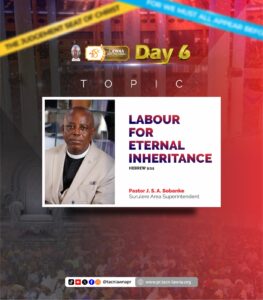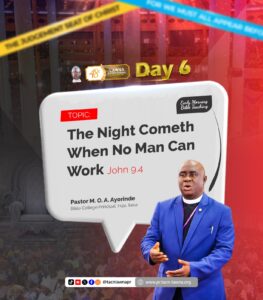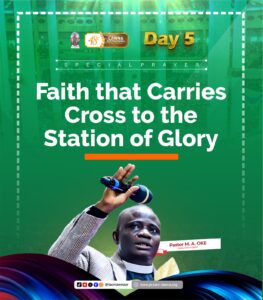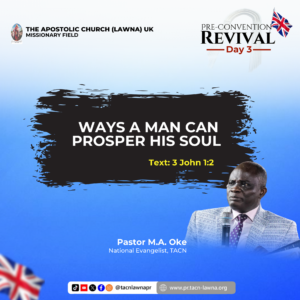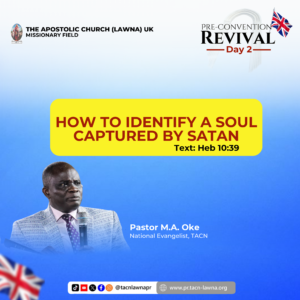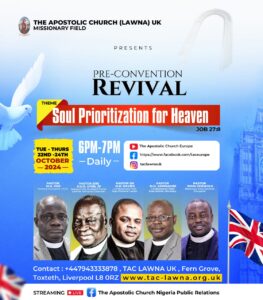”Are you ready for The Day of The Lord?”
If you are ready for the Day of the LORD too, do not give in to external things (too) – things that might want to lure you out from (or make you forget) the concept of the Day of the Lord in connection with the Second Coming of Christ. Do not be deceived, Christ is coming again!
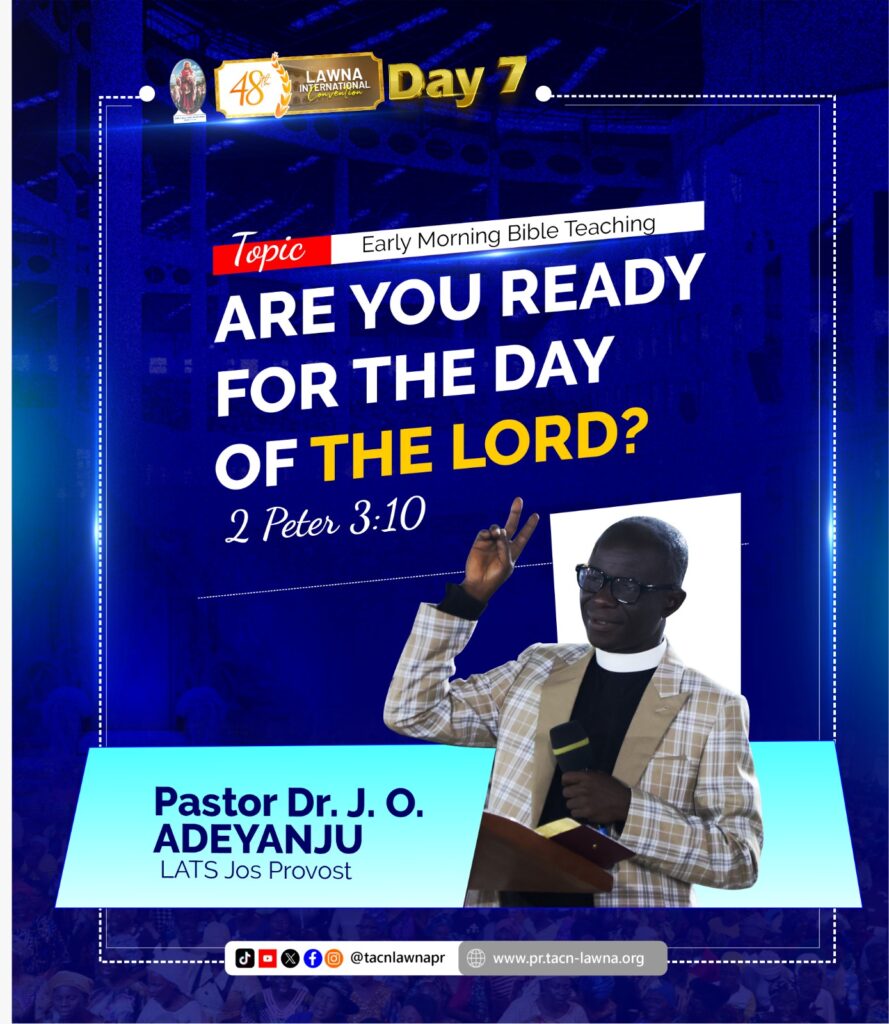
THE APOSTOLIC CHURCH NIGERIA (TACN) LAWNA TERRITORIAL INT’L 48TH ANNUAL CONVENTION FRIDAY MORNING BIBLE TEACHING (AUGUST 09, 2024) DELIVERED BY PASTOR JAMES O. ADEYANJU, PhD (PROVOST, TACN LATS JOS)
TITLED: “ARE YOU READY FOR THE DAY OF THE LORD?” (II Pet. 3:10)
Prayer & Protocol
- Introduction
The phrase, the “Day of the Lord,” occurs some 375 times in the KJV and thereabout in other translations of the Bible. It is quite different from “a day of the Lord,” the definite and indefinite articles make the difference. But both denote judgment. The judgment connected to “a day of the Lord” is regional. E.g., the day Jerusalem fell into the hand of the Babylonians was a day of the Lord (Lam. 2:1, 7; cf. Isa. 22:5; 7:18-25). The judgment then was limited to the Judeans alone for breaching the Mosaic laws handed down to them (cf. Deut. 28:64-67). It did not affect the surrounding nations and kingdoms around Judah. “A day of the Lord” is, therefore, quite different from the “Day of the Lord.”
- Definition, Nature and Characteristics of “the Day of the Lord”
What the Day of the Lord is Not:
(a) It is not the Lord’s Day – we collective worship God; i.e. Sunday (cf. Rev. 1:10); (b) It is not the special TACN special meetings: Elders’ Lord’s Day & Apostles’ Lord’s Day. These are days commanded by God through prophetical injunctions for the Church (in Ebute Metta, Olorunda Ketu and other zonal centres respectively).
Rather, it means the following:
- It talks of possession: At the most basic level, the Day of the Lord refers to the “day” that belongs to God.
- Its Understanding: The nature of this “day” should not be necessarily understood as 24-hour period of time but rather a more generic reference to “the time-period that belongs to God.”
- Hence, it is figurative in nature, and not according to human reckoning of time.
- The event(s) connected to the Day of the Lord will begin in a particular day.
- Technically, it is described as the Day of the Lord because God controls and directs the events therein.
- The judgmental events attached to “the Day of the Lord” are, or will be, universal. That is, it is an event that will affect the whole world. For this reason, it is different from “a day of the Lord.”
- It begins with the Second Coming of Christ, starting with the rapture (for the Church) and the 2nd phase for all to see.
- It is the “day” God will judge the unrighteous (the wicked) but rewards (vindicates) the righteous; it depends where each person lies, with regards to God’s redemptive plan through the finished work of Christ, at the time. This notion is leading us to the Third Point in this teaching.
- “The Day of the Lord” as Consisting in Judgment
By the inspiration of His Spirit, God projected the denotations of the judgment that would befall the unrighteous (the wicked) on “the Day of the Lord.” The Bible refers to it in terrible terms.
- Isaiah (2:12; 13:6, 9; 34: 8) –
- “…It shall be upon everyone that is proud and lofty…upon every one that is lifted up, and he shall be brought low” (2:12)
- “It shall come as a destruction from the Almighty” (13:6)
- It comes, “cruel both with wrath and fierce anger, to lay the land desolate and…destroy the sinners thereof” (13:9)
- “It is the day of the LORD’s vengeance and the year of recompense…” (34:8)
- Jeremiah (46:10) – Its “a day of vengeance that God may avenge Himself of His adversaries: and the sword shall devour, and it shall be satiate and made drunk with their blood…”
- Joel (2:11) – “For the Day of the LORD is great and very terrible; who can abide it?”
- Amos (5:18, 20) – “…The Day of the LORD is darkness, and not light”
- Obadiah (v. 15) – “For the Day of the LORD is near upon all the heathen: as thou hast done, it shall be done unto thee…”
- Zephaniah (1:14, 15) – “The great day of the LORD is near…the mighty man shall cry there bitterly.”
- Apostle Paul (I Thess. 5:2, 3; cf. II Pet. 3:10) – “…The Day of the Lord as a thief in the night. For when they say, Peace and safety; …sudden destruction cometh upon them, as travail upon a woman with child.”
- “The Day of the Lord” as Consisting in Rewards for the Righteous
Apart from God’s judgment upon the wicked (the unrighteous), on “the Day of Lord,” God shall also reward the righteous – His people. We shall give more attention to this aspect in this teaching. The righteous here are those who:
- Have been saved through the redemption plan of God through the Person and event of Christ (cf. Eph. 1:7; Rom. 3:24; I Cor. 1:30; etc.)
- And who have consistently followed Him and adhered to His rules, norms, and instructions through much endurance and patience (cf. Rev. 14:4); and
- Have laboured to expand the frontiers of His kingdom here on earth through various Christian means (cf. Matt. 19:27-29)
This period of reward is further divisible into two time-periods: (i) the Rapture and its attendant rewards; and (ii) the millennial reign with Christ.
- The Rapture and Its Attendant Blessings for the Saints (Read I Thess. 4:16, 17; I Cor. 15:51-53)
- The event of the rapture is variously described in the New Testament (NT) in two (02) major places among others:
- It is called the Day of Christ in Philp. 1:10.
- Described as “on that day” in II Tim. 4:8 (i.e., a particular “day”).
- After the rapture, the saints shall be summoned to the Judgment Seat of Christ (Read II Cor. 5:10; Rm. 14:10). The judgment seat of Christ is denoted as “that day” when God shall judge the secrets of men by Jesus Christ…” (Rom. 2:16).
- The main idea in mind in this setting is never to determine whether a believer is saved or not. Rather, it is a forum for evaluating the services and activities done for the Lord and His Kingdom by the believers. The saints shall be rewarded based on the outcome of the evaluation (Read Matt. 16:27). Mainly, the quality of believers’ works would be rated using the worth of the following materials:
- Gold – Silver – Precious Stone
- Wood – Hay – Straw ( Read I Cor. 3:12-15)
- Three (03) major criteria (yardsticks) shall be employed while examining the works (i.e., the services) of the saints at the judgment seat of Christ:
- “What is your motive for engaging in an activity or service?”
- “Do your services build up or edify the Body (i.e., the Church)?”
- “Do you carry out the assignments to satisfy self or to glorify God?”
- What the Believers would be Rewarded For:
- Diligence. Diligence in seeking God (Heb. 11:6)
- Perseverance. Those who persevere to the end would be rewarded (Rev. 2:26, 27)
- Soulwining. Leading others to Christ (I Thess. 2:19)
- Faithfulness. Faithfulness to Christ (I Cor. 4:1-5)
- Diligence. Diligence in Christian walk (I Cor. 9:24-27; Heb. 6:11, 12; II Pet. 1:10, 11)
- Reliability. Trustworthy stewardship (Luk. 19:11-27)
- Endurance. Endurance of persecution (Matt. 5:11, 12; II Tim. 2:12, 13; Heb. 10:36)
- Continuity. Continuing abiding with Christ (I Jn. 2:28)
- Benevolence. Benevolence towards the poor (Mk. 10:21; Luk. 12:32, 33)
- Ministry in the Body. Ministering to the saints (Heb. 6:10).
- Eventually, five (05) Crowns shall emerge for meritorious services done to the Lord by the saints while they were still in the body on earth before the rapture. These are:
- Crown of life, given for enduring hardship (or hard times) (James 1:12; Rev. 2:10).
- Crown of rejoicing, provided for consistently getting involved in soulwining and Church planting (I Thess. 2:19).
- Incorruptible crown, supplied for running the Christian race according to the principles and injunctions (I Cor. 9:25).
- Crown of righteousness, obtainable for remaining righteous while enduring suffering (II Tim. 4:8).
- Crown of glory for leaders who lead and administer well (I Pet. 5:4).
- The Event after the Judgment Seat of Christ, Leading to the Millennial Reign
- The saints shall be in the heavenly realm where and when the rewards above shall take place for a period of seven (07) years. During the seven (07) years, the Great Tribulation – a very terrible time described in Revelation chs. 6-19 (cf. Jer. 30:7; Dan. 12:1), designed for the unbelievers after the saints have been removed from the earthly scene will occur.
- After the seven (07) years, following Christ’s victory at the Battle of Armageddon, with the fallout of the last 02 “vial judgments” – resulting in universal earthquake and pandemonium (Rev. chs. 16-19), the saints will return to the earthly scene with the saints. This is the event in view while reading passages such as Rev. 1:7 (cf. Jude, 14; Zech. 12:10). During this time, “Every eye shall see Christ” in this second phase of His Second Coming. NB. The Rapture is the first phase but for the believers alone.
- During this time, the believers will not just reign with Christ but will also be ushered into the Millennial Reign with Him (Rev. 20:6) where they shall rule with Him. This shall happen in the absence of the dead, who will not partake in the rapture and its resurrection!
- After the Millennial Reign, believers shall spend eternity with God. The saints shall be in the presence of God, described as the “New Jerusalem.” All troubles shall cease; all tears shall be wiped away. The believers shall have access to the Tree of life again (Rev. 22:14; 2:7; 22:2; cf. Gen. 2:9; 3:22, 24). This means that we shall live with God forever. Amen!
- Application: Are you ready for the “Day of the Lord”?
- In the light of all that we have discussed in this teaching, I want to believe that our answer to the question above will be in the affirmative that we are ready for the Day of the Lord. Those things, especially the rewards are sweet to hear. Are we all in Christ? If you are not, repent and surrender to Christ. If you are a believer. Be careful!
- In the days of Apostle Peter, when he spoke about the Day of the Lord, there were some individuals, described as “Scoffers” who wanted to lead the Christians of that time from the awareness regarding the Day of the Lord. The “Scoffers” were non-Christian, external figures. They belittled the idea of the Second of Christ. In a derisive manner, the “scoffers” made two (02) claims by asking:
- “Where is the promise of His coming?
- “Since the fathers fell asleep, all things have continued as they did from the beginning of creation” (II Pet. 3:4).
Apostle Peter warned the Church not to give in to their deceits – the “Scoffers” were agent of distraction!
If you are ready for the Day of the LORD too, do not give in to external things (too) – things that might want to lure you out from (or make you forget) the concept of the Day of the Lord in connection with the Second Coming of Christ. Do not be deceived, Christ is coming again!
Believers’ Responsibilities:
Like the ancient people of Apostle Peter’s time, there are external things to be careful of:
- Nigeria’s harsh economic realities, resulting in inflation, joblessness and high cost of living = Be careful so that this scenario does not unnecessarily lead you to prostitution, fraud, financial scam, etc. Do not go for money ritual. If you need to travel out of the country, do so lawfully.
- Corruption = Do not allow this to lure you up to examination malpractices, falsification of age, and other related vices.
- Religious fundamentalism, leading to Christian persecution, killings, and burning down of church buildings
- Ritual killings for money-making ventures.
- Banditry & kidnapping, and payment of ransom or senseless killings even after ransom payment = Be careful of points (ii), (iii) and (iv) here so that they do not lead you up to making charms and talisman or other fetish things for self protection. Be careful of agreeing with the teaching that all religions lead to God!
- Marital infertility/Barrenness = Be careful so that such does not lead you up to child-producing rituals.
- Other life’s problems = Be careful so that such they do not lure you away from the Christian faith and its orthodox practices
- Conclusion
- Do not be bogged down by life’s troubles. We live in a life of troubles and challenges.
- Maintain your boldness in the Lord to the end (Heb. 10:35, 36).
- Live daily with eternity in view. Live with renewed hope daily, believing that Christ will come.
- Sustain continuous holy and sanctified life. Without holiness, no one shall see the Lord (Heb. 12:14).
- Serve God to the best of your ability (Col. 3:24).
As we close this teaching, shall we please sing RH 155 (Appendix). I thank the fathers (our leaders) for giving me the opportunity to give the teaching.
